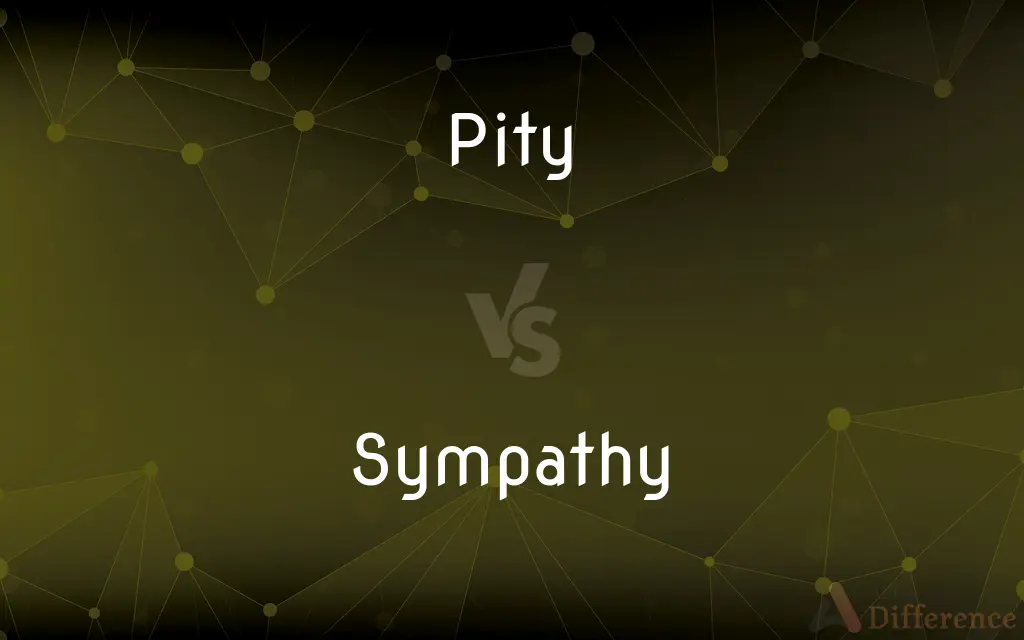Pity vs. Sympathy — What's the Difference?
By Urooj Arif & Fiza Rafique — Updated on April 15, 2024
Pity often conveys a sense of condescension towards someone's misfortunes, while sympathy involves sharing feelings of sorrow or concern, emphasizing emotional support.

Difference Between Pity and Sympathy
Table of Contents
ADVERTISEMENT
Key Differences
Pity involves feeling sorry for someone, often from a position of superiority or detachment. While sympathy, on the other hand, implies a deeper emotional connection and understanding of another's hardship.
Pity might not require personal empathy or shared experiences, whereas sympathy usually involves relating to what another person is going through, often by drawing on one's own emotional experiences.
Pity can sometimes be viewed negatively, as it may suggest mere acknowledgment of distress without an offer of aid or emotional involvement. In contrast, sympathy is generally seen as compassionate and supportive, fostering a bond between individuals.
People often feel pity for someone without any intent to help or engage further, while sympathy might motivate one to offer comfort or assistance.
Pity is typically more passive and less involved, whereas sympathy can lead to an active response, aiming to alleviate the person's distress.
ADVERTISEMENT
Comparison Chart
Definition
Feeling of sorrow for someone's misfortune
Sharing or understanding someone's feelings
Emotional Depth
Less deep, often condescending
Deeper, empathetic
Connection
Detached
Emotional and personal connection
Motivation to Help
Not necessarily motivated to help
Often motivates offering support
Perception
Sometimes negative
Generally positive
Compare with Definitions
Pity
Does not necessarily involve empathy.
The wealthy donor’s pity did not seem genuine.
Sympathy
Fosters an emotional and personal connection.
Their sympathy during his illness was a great comfort.
Pity
An emotion less engaged with personal feelings.
His pity for her situation didn't lead to any concrete help.
Sympathy
Understanding or sharing the feelings of another.
She expressed deep sympathy for her friend’s loss.
Pity
Feeling sorrow for someone's misfortune.
She felt pity for the stray animals in the cold.
Sympathy
Seen as a positive and compassionate response.
Her sympathy was appreciated more than any material aid.
Pity
Can be passive and removed from action.
They watched in pity but didn't offer assistance.
Sympathy
Involves emotional engagement and support.
He showed sympathy by listening to her story attentively.
Pity
Often viewed as condescending or patronizing.
His offer was full of pity, which she found off-putting.
Sympathy
Often motivates actions to alleviate someone's distress.
Moved by sympathy, she volunteered at the shelter.
Pity
Pity is a sympathetic sorrow evoked by the suffering of others, and is used in a comparable sense to compassion, condolence or empathy - the word deriving from the Latin pietās (etymon also of piety). Self-pity is pity directed towards oneself.
Sympathy
Sympathy is the perception, understanding, and reaction to the distress or need of another life form. According to David Hume, this sympathetic concern is driven by a switch in viewpoint from a personal perspective to the perspective of another group or individual who is in need.
Pity
Sympathy and sorrow aroused by the misfortune or suffering of another.
Sympathy
A feeling of pity or sorrow for the distress of another; commiseration.
Pity
A matter of regret
It's a pity she can't attend the reception.
Sympathy
Often sympathies An expression of such feeling
Offered her sympathies to the mourning family.
Pity
To feel pity for or on account of
"No, he could not believe it a bad house.
Not such a house as a man was to be pitied for having" (Jane Austen). "An office worker pitied his confinement and slipped in to give him a loaf of bread" (Eric Scigliano).
Sympathy
Mutual understanding or feeling between people
"Like two frightened children, we sought at the same time to comfort one another, so quick was the sympathy between us" (Nicholas Meyer).
Pity
To feel pity.
Sympathy
Agreement with or support for an opinion or position
The mayor is in sympathy with the proposal.
Pity
(uncountable) A feeling of sympathy at the misfortune or suffering of someone or something.
I can't feel any pity towards the gang, who got injured while attempting to break into a flat.
Take pity on someone
Sympathy
Often sympathies A tendency to support a position or opinion
A politician of conservative sympathies.
Pity
(countable) Something regrettable.
It's a pity you're feeling unwell because there's a party on tonight.
What a pity about the band breaking up. I loved them!
Sympathy
A relationship or affinity between things in which whatever affects one correspondingly affects the other
"Continuous measurements of ionospheric densities ... showed a variation of noon ionization in sympathy with sunspot activity" (E.V. Appelton).
Pity
(obsolete) Piety.
Sympathy
(Physics) A relation between bodies such that vibrations in one body cause sympathetic vibrations in another.
Pity
(transitive) To feel pity for (someone or something).
You have got to pity the guy - he lost his wife, mother and job in the same month.
Sympathy
(Physiology) A relation between parts or organs by which a disease or disorder in one induces an effect in the other.
Pity
To make (someone) feel pity; to provoke the sympathy or compassion of.
Sympathy
A feeling of pity or sorrow for the suffering or distress of another.
Pity
Short form of what a pity.
Sympathy
(in plural) The formal expression of pity or sorrow for someone else's misfortune.
Pity
Piety.
Sympathy
The ability to share the feelings of another.
Pity
A feeling for the sufferings or distresses of another or others; sympathy with the grief or misery of another; compassion; fellow-feeling; commiseration.
He that hath pity upon the poor lendeth unto the Lord.
He . . . has no more pity in him than a dog.
Sympathy
Inclination to think or feel alike; emotional or intellectual accord; common feeling.
Pity
A reason or cause of pity, grief, or regret; a thing to be regretted.
What pity is itThat we can die but once to serve our country!
Sympathy
(in plural) Support in the form of shared feelings or opinions.
Pity
To feel pity or compassion for; to have sympathy with; to compassionate; to commiserate; to have tender feelings toward (any one), awakened by a knowledge of suffering.
Like as a father pitieth his children, so the Lord pitieth them that fear him.
Sympathy
Feeling of loyalty; tendency towards, agreement with or approval of an opinion or aim; a favorable attitude.
Many people in Hollywood were blacklisted merely because they were suspected of Communist sympathies.
Pity
To move to pity; - used impersonally.
It pitieth them to see her in the dust.
Sympathy
An affinity, association or mutual relationship between people or things such that they are correspondingly affected by any condition.
Pity
To be compassionate; to show pity.
I will not pity, nor spare, nor have mercy.
Sympathy
Mutual or parallel susceptibility or a condition brought about by it.
Pity
A feeling of sympathy and sorrow for the misfortunes of others;
The blind are too often objects of pity
Sympathy
(art) Artistic harmony, as of shape or colour in a painting.
Pity
An unfortunate development;
It's a pity he couldn't do it
Sympathy
Feeling corresponding to that which another feels; the quality of being affected by the affection of another, with feelings correspondent in kind, if not in degree; fellow-feeling.
They saw, but other sight instead - a crowdOf ugly serpents! Horror on them fell,And horrid sympathy.
Pity
The humane quality of understanding the suffering of others and wanting to do something about it
Sympathy
An agreement of affections or inclinations, or a conformity of natural temperament, which causes persons to be pleased, or in accord, with one another; as, there is perfect sympathy between them.
Pity
Share the suffering of
Sympathy
Kindness of feeling toward one who suffers; pity; commiseration; compassion.
I value myself upon sympathy, I hate and despise myself for envy.
Sympathy
The reciprocal influence exercised by organs or parts on one another, as shown in the effects of a diseased condition of one part on another part or organ, as in the vomiting produced by a tumor of the brain.
Sympathy
A tendency of inanimate things to unite, or to act on each other; as, the sympathy between the loadstone and iron.
Sympathy
Similarity of function, use office, or the like.
The adverb has most sympathy with the verb.
Fault,Acknowledged and deplored, in Adam wroughtCommiseration.
Sympathy
An inclination to support or be loyal to or to agree with an opinion;
His sympathies were always with the underdog
I knew I could count on his understanding
Sympathy
Sharing the feelings of others (especially feelings of sorrow or anguish)
Sympathy
A relation of affinity or harmony between people; whatever affects one correspondingly affects the other;
The two of them were in close sympathy
Common Curiosities
How does sympathy motivate someone to take action?
Sympathy often leads to efforts to comfort or assist the person in distress because it involves shared feelings.
Can pity be perceived negatively?
Yes, pity can sometimes be seen as condescending or patronizing.
Does sympathy always involve emotional support?
Typically, sympathy involves emotional understanding and support, aiming to connect with the person’s feelings.
How can expressing sympathy affect a relationship?
Expressing sympathy can strengthen relationships by showing care and understanding, which helps build trust and emotional bonds.
Is it possible to feel both pity and sympathy for someone?
Yes, it is possible to feel both pity and sympathy for someone, depending on the context and one’s relationship with the person in distress.
How do cultural perceptions affect the expression of pity and sympathy?
Cultural backgrounds can significantly influence how and when pity or sympathy is expressed, and what is considered appropriate in showing these emotions.
What triggers a feeling of pity in a person?
Pity is often triggered by witnessing someone else's misfortunes or difficulties, especially those that the observer feels are severe or pitiable.
What role does personal experience play in feeling sympathy?
Personal experiences that resonate with another's situation can deepen sympathy, as they allow one to genuinely relate to and understand the other's emotions.
What is the main emotional difference between pity and sympathy?
Pity is generally less personal and more detached, while sympathy involves a deeper emotional connection.
Is pity associated with a desire to help?
Pity does not necessarily motivate a person to help; it can be quite passive.
What are the social functions of expressing pity and sympathy?
Expressing sympathy helps maintain social bonds and community cohesion by showing mutual support, whereas pity might serve to highlight social inequalities or inspire charitable actions.
Can pity ever be helpful?
While often viewed negatively, pity can sometimes lead to helpful actions, though it might not be motivated by genuine emotional connection.
How do children learn the concepts of pity and sympathy?
Children learn these emotions through social interactions and cultural norms, often modeled by adults' responses to others' feelings or situations.
What psychological effects might a person experiencing pity or sympathy undergo?
Experiencing sympathy can lead to emotional enrichment and a sense of fulfillment, while pity might cause a person to feel detached or superior.
Can animals exhibit pity or sympathy?
Animals, particularly social species like elephants and dogs, can exhibit behaviors that suggest forms of sympathy, though it's unclear if they experience pity in the human sense.
Share Your Discovery

Previous Comparison
Sinhalese vs. Tamil
Next Comparison
Reject vs. WithdrawAuthor Spotlight
Written by
Urooj ArifUrooj is a skilled content writer at Ask Difference, known for her exceptional ability to simplify complex topics into engaging and informative content. With a passion for research and a flair for clear, concise writing, she consistently delivers articles that resonate with our diverse audience.
Co-written by
Fiza RafiqueFiza Rafique is a skilled content writer at AskDifference.com, where she meticulously refines and enhances written pieces. Drawing from her vast editorial expertise, Fiza ensures clarity, accuracy, and precision in every article. Passionate about language, she continually seeks to elevate the quality of content for readers worldwide.














































